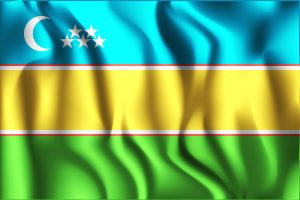Nietbay Urazbayev, a leader among the Karakalpak diaspora in Kazakhstan, died in an Almaty hospital this week at the age of 54 after suffering a heart attack, according to reports from fellow activists. His death marks a sudden end to a particularly difficult period of pressure that saw him tried and convicted in absentia by Uzbekistan, and then stripped of his Kazakh citizenship, opening wider the door to a much-feared possibility that he’d be returned to Uzbekistan by force, either deported or kidnapped.
Karakalpakstan, often described as an autonomous region within Uzbekistan, is in actuality a republic unto itself. Uzbekistan’s constitution (Articles 85-90 in the current version) refers to Karakalpakstan as “sovereign” and states, clearly, that the republic has the right to secede from Uzbekistan via referendum. No such referendum has ever taken place, though Karakalpak activists, like Urazbayev, have long pushed for it.
In the summer of 2022, Uzbek authorities released a first draft of a constitutional referendum that, among other things, removed Karakalpakstan’s right to secession. Protests erupted in Nukus, Karakalpakstan’s capital.
Urazbayev had moved to Kazakhstan in 2004 from Karakalpakstan, under pressure for his human rights work. He later founded the Karakalpak ethno-cultural center “Allayar Zholy” in Mangystau, where he settled. In 2017, he acquired Kazakh citizenship.
When the protests broke out in July 2022, Urazbayev posted a video statement supporting the protesters.
Although Tashkent backtracked swiftly and left the constitutional provisions relating to Karakalpakstan intact, Uzbek authorities prosecuted a total of 61 people on a variety of charges related to the unrest, most notably “undermining the constitutional order.” The authorities also tried two more people in absentia: Urazbayev and a fellow exile Karakalpak activist, Aman Sagidullayev. The two men were convinced on a variety of charges ranging from insulting the president of Uzbekistan to conspiracy to overthrow the constitutional order and organizing riots.
Sagidullayev was sentenced to 18 years in prison and Urazbayev to 12 years. The former lives in Norway, where he and his family have political asylum. Living so close to Uzbekistan in Kazakhstan, Urazbayev told The Diplomat in May 2023, “I am worried I may be secretly sent to Uzbekistan. The Uzbekistan border is very close to where I live.”
Fellow Kazakhstan-based Karakalpak activist Aqylbek Muratbai told RFE/RL’s Kazakh Service that Urazbayev had left Mangystau in recent months to stay with his daughter in Almaty, Kazakhstan’s largest city, fearing for his safety. And Urazbayev had reason to worry.
In December the Kazakhstan International Bureau for Human Rights (KIBHR), citing Vitaly Ponomarev, director of the Central Asian program of Human Rights Centre (HRC) Memorial, reported that Urazbayev had received a notice that his Kazakh citizenship had been annulled — with Kazakh authorities claiming that Urazbayev had presented an “invalid and counterfeit” certificate in 2017 as proof of his renunciation of his Uzbek citizenship. Neither Kazakhstan nor Uzbekistan recognizes dual citizenship. In order to obtain Kazakh citizenship, an individual has to formally renounce their previous citizenship.
In a December 19 post on X, formerly Twitter, Muratbai had outlined Urazbayev’s case, noting that Uzbek authorities had threatened to use the citizenship issue — suggesting his Uzbek citizenship might be miraculously restored and problems created for him in Kazakhstan — and had followed through on the threat.
“The threats voiced by an Uzbek diplomat in 2019 were fulfilled and now the risk of Urazbayev’s extradition to Uzbekistan on a politically motivated case has sharply increased,” Muratbai wrote. He went on argue that Urazbayev’ case was a “clear signal and threat to all ethnic Karakalpaks abroad, most of whom are former citizens of Uzbekistan.” He also argued, passionately, that the efforts of the Uzbek authorities “do not solve problems, but inflame tensions” instead.
Muratbai went on to explain his own personal journey from an apolitical activist, working with Karakalpak labor migrants and on cultural events, to an outspoken member of the Karakalpak diaspora. The arrest of Koshkarbai Toremuratov, a friend who was later released after a year in jail, triggered Muratbai’s transformation.
Ultimately, in their attempts to repress one fighter for the rights of Karakalpaks, the Uzbek authorities have already received at least two in the peron of me and Koshkarbai Toremuratov. Therefore, it is very likely and even obvious that further persecution of the above-mentioned Neitbay Urazbayev and other civil activists will only lead to the exacerbation of the situation in Karakalpakstan and to the strengthening of the Karakalpak national movement. Those who have been silent will start speaking anonymously. Those who have already spoken anonymously will start to act openly. Those who have been speaking openly will, in the best case, start to do so louder and more often, and in the worst case (which is already being observed) will finally get tired of waiting for dialogue with the Mirziyoyev regime in Uzbekistan and will start to call for more radical actions in the struggle for the independence of Karakalpakstan. In the long term, will this bring peace and tranquility in relations between Uzbeks and Karakalpaks? Unlikely.
“One of the best of our people has left — and this further complicates relations between the Karakalpaks and the Uzbek authorities,” Muratbai told The Diplomat, stating that the final paragraph of his December 19 post is what he most wanted to convey in the wake of Urazbayev’s death.































